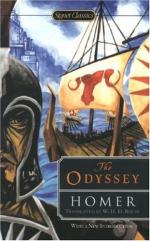“Ulysses,” replied Alcinous, “not one of us who sees you has any idea that you are a charlatan or a swindler. I know there are many people going about who tell such plausible stories that it is very hard to see through them, but there is a style about your language which assures me of your good disposition. Moreover you have told the story of your own misfortunes, and those of the Argives, as though you were a practiced bard; but tell me, and tell me true, whether you saw any of the mighty heroes who went to Troy at the same time with yourself, and perished there. The evenings are still at their longest, and it is not yet bed time—go on, therefore, with your divine story, for I could stay here listening till tomorrow morning, so long as you will continue to tell us of your adventures.”
“Alcinous,” answered Ulysses, “there is a time for making speeches, and a time for going to bed; nevertheless, since you so desire, I will not refrain from telling you the still sadder tale of those of my comrades who did not fall fighting with the Trojans, but perished on their return, through the treachery of a wicked woman.
“When Proserpine had dismissed the female ghosts in all directions, the ghost of Agamemnon son of Atreus came sadly up to me, surrounded by those who had perished with him in the house of Aegisthus. As soon as he had tasted the blood, he knew me, and weeping bitterly stretched out his arms towards me to embrace me; but he had no strength nor substance any more, and I too wept and pitied him as I beheld him. ’How did you come by your death,’ said I, ’King Agamemnon? Did Neptune raise his winds and waves against you when you were at sea, or did your enemies make an end of you on the main land when you were cattle-lifting or sheep-stealing, or while they were fighting in defence of their wives and city?’
“‘Ulysses,’ he answered, ’noble son of Laertes, I was not lost at sea in any storm of Neptune’s raising, nor did my foes despatch me upon the mainland, but Aegisthus and my wicked wife were the death of me between them. He asked me to his house, feasted me, and then butchered me most miserably as though I were a fat beast in a slaughter house, while all around me my comrades were slain like sheep or pigs for the wedding breakfast, or picnic, or gorgeous banquet of some great nobleman. You must have seen numbers of men killed either in a general engagement, or in single combat, but you never saw anything so truly pitiable as the way in which we fell in that cloister, with the mixing bowl and the loaded tables lying all about, and the ground reeking with our blood. I heard Priam’s daughter Cassandra scream as Clytemnestra killed her close beside me. I lay dying upon the earth with the sword in my body, and raised my hands to kill the slut of a murderess, but she slipped away from me; she would not even close my lips nor my eyes when I was dying, for there is nothing in this world so cruel and so shameless as a woman when she has fallen into such guilt as hers was. Fancy murdering her own husband! I thought I was going to be welcomed home by my children and my servants, but her abominable crime has brought disgrace on herself and all women who shall come after—even on the good ones.’




